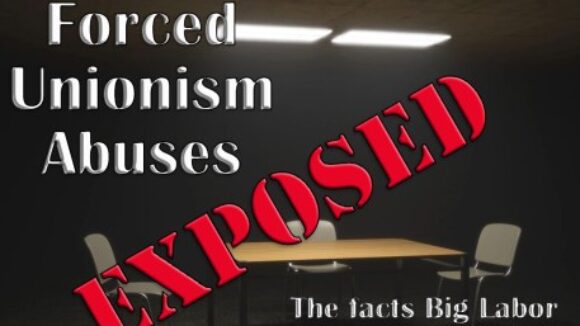Biden Bureaucrats Move to Gut Constitutional Right to Work Protections For Federal Employees
When Right to Work advocates made their first valiant, although diffuse, efforts to stop the spread of government-imposed compulsory union membership…

“[C]ompulsory unionism and corruption go hand in hand . . . .”
— U.S. Sen. John McClellan (D-Ark.)
Roughly eight years ago, when U.S. Rep. Beto O’Rourke (Texas) was still a member of the El Paso City Council, he did not anticipate he would later be seeking the Democrat Party’s 2020 presidential nomination. At least, that’s the most plausible explanation for why he felt relatively free at that time to acknowledge that taxpayers and other citizens who depend on vital public services are hurt when Big Labor is handed monopoly control over public workers.
In June 2011, O’Rourke bluntly told an interviewer: “From my experience these last six years on City Council, I do not think it is in the community’s best interests, certainly not the taxpayers’ best interests, to have [monopolistic] collective bargaining by police and firefighters.”
Four months later, he dared to publicly suggest that Texas might be wise to “do away with” the provisions in the state code that authorize government-sector union monopoly bargaining in some cases.
In 2019, of course, O’Rourke’s political handlers are desperately trying to explain away such statements as he solicits Big Labor forced-dues support for his presidential bid. But the latest analysis of unfunded liabilities of state-administered pension plans in the 50 states by the American Legislative Exchange Council (ALEC) supplies still more evidence that Councilman O’Rourke was right about the impact of special bargaining privileges for government union bosses.
“Unaccountable and Unaffordable 2018,” released by ALEC in March, reports that, in the aggregate, unfunded liabilities of state administered pension plans, using a “proper, risk-free discount rate,” now total over $5.96 trillion. Such unfunded liabilities add up to $18,300 “for every resident of the United States.”
And ALEC’s findings further show there is a strong negative correlation between a state’s solvency
and public policies authorizing the termination of employees for refusal to fork over forced dues or fees to an unwanted union.
The 23 states that have yet to adopt Right to Work laws prohibiting forced union dues and fees have an average unfunded per capita pension liability of $23,199. In contrast, the 27 states with Right to Work laws in effect have a large, but more manageable aggregate per capita pension liability that is 41% lower.
All of the six states with the greatest per capita government pension liability (Alaska, Connecticut, California, Illinois, Oregon and Hawaii) foist forced union dues and fees on employees. But all of the nine states with the lowest per capita pension liability (Tennessee, Indiana, Nebraska, Florida, Idaho, Wisconsin, Utah, North Carolina and Oklahoma) are Right to Work states.
Expressed as a share of Gross State Product, the average unfunded pension liability for forced-dues states is 35%, compared to an average of 26% for Right to Work states.
It’s not difficult to see how Right to Work laws help prevent politicians’ irresponsibility from getting totally out of hand. In jurisdictions where forced union dues and fees have been permitted and union monopoly bargaining in the public-sector has been authorized for years, union bosses negotiate with government employers over civil servants’ pay, benefits, and working conditions.
Meanwhile, for many years, government union chiefs have funneled a large portion of the compulsory dues and fees they collected into efforts to influence the outcomes of state and local elections. And those outcomes often determine who represents the public at the bargaining table.
To quote O’Rourke, jurisdictions whose politicians are excessively beholden to Big Labor ultimately “run out of money and . . . have to start laying people off.”
Last summer, the U.S. Supreme Court threw out a lifeline to fiscally troubled Big Labor stronghold states like Connecticut, California and Illinois with its Janus decision.
Ruling in favor of independent-minded Illinois civil servant Mark Janus in a case argued and won on his behalf by Right to Work staff attorney William Messenger, the High Court found that extracting forced fees from public employees as a job condition violates the First Amendment.
This was primarily a victory for individual rights. Its potential impact on state budgets is also vast. Janus is already giving lawmakers in state after state an opportunity to reassert control over public pension obligations and protect taxpayers.
And as O’Rourke’s experience as a city official in Right to Work Texas illustrates, much remains to be done. Repeal of government-sector monopoly-bargaining statutes, along with passage of additional state laws protecting private-sector employees’ Right to Work, are indispensable parts of public budget reform.
If you have questions about whether union officials are violating your rights, contact the Foundation for free help. To take action by supporting The National Right to Work Committee and fueling the fight against Forced Unionism, click here to donate now.

When Right to Work advocates made their first valiant, although diffuse, efforts to stop the spread of government-imposed compulsory union membership…

Years ago, the ILA was identified by the President’s Commission on Organized Crime as one of a handful of international unions with “histories of control or influence by organized crime.”...

Flight Attendant Triumphs Over TWU Union and Southwest in Suit About Illegal Firing; Jury Awards $5.1 Million in Damages TWU union…